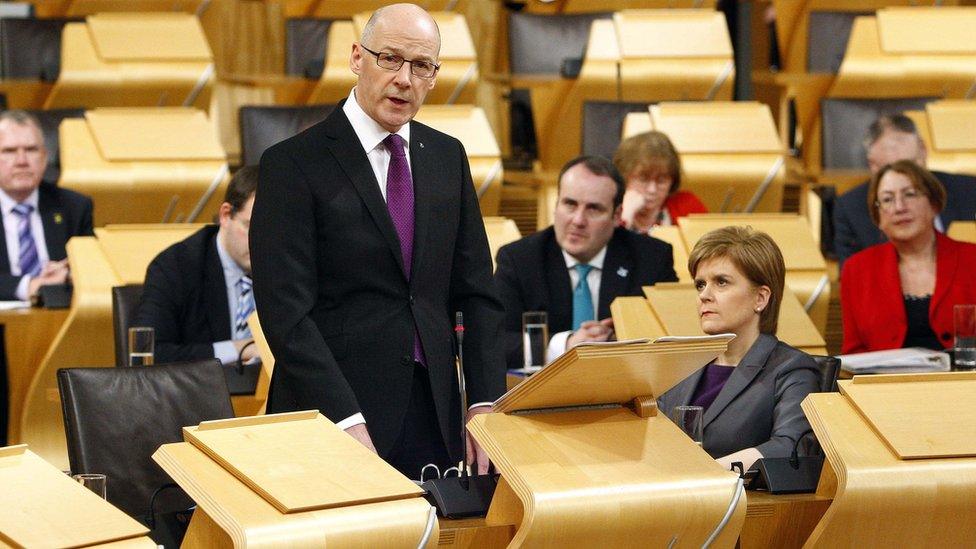Scottish budget 2016/17: John Swinney defends council budget cuts
- Published

John Swinney said his government had given "strong base level" support to the country's councils for many years
Scotland's Finance Secretary John Swinney has defended his budget decision to cut local government revenues by 3.5% for 2016/17.
He told BBC Radio Scotland's Good Morning Scotland programme that in England councils had faced reductions of about 27%.
But local government body Cosla said the cuts were "totally unacceptable".
Mr Swinney's budget, delivered on Wednesday, pledged no change to income tax and a continued council tax freeze.
Opposition parties have claimed cuts to council spending could derail the Scottish government's flagship plans to close the country's education attainment gap.
But Mr Swinney said the Scottish government had been fair to Scotland's 32 councils over many years.
Local government in Scotland
What's the 2016/17 budget deal?
£9,545m
Revenue funding for the country's 32 councils
-
£250m - new money for health and social care
-
£70m - to continue the council tax freeze
-
£88m - to maintain teacher numbers at 2015 levels
He said: "If you compare the situation of Scottish local government with English local government - English local government over the last few years has gone down by 27% in its funding and Scottish local government has essentially had flat cash from the Scottish government for a number of years.
"So it starts from a much higher baseline figure for the provision of local authority service."
Mr Swinney argued that the revenue reduction had to be seen in the context of funding increases elsewhere.
He explained: "Now the reduction of 3.5% is in resource terms, but that is not the only thing you have to look at.
"You have to look at the fact I announced one of the largest reforms in the delivery of health and social care there has been since the foundation of the National Health Service in 1948 with an injection from the health resources of £250m into the delivery of health and social care services at local level."
'We got a huge cash cut'
However, Councillor Michael Cook, who is vice president of Cosla which represents most Scottish councils, said the cut to council funding was the result of policy choices by the Scottish government rather than a "pass-on" from Westminster.
He told BBC Scotland: "Not only have we got a huge cash cut, but we have massive additional pressures and all of this boils down to a picture of job losses and services slashed.
"An assessment has been done in relation to the potential job impact and that looks like 15,000 jobs - that is equivalent to 50 Tata steelworks and that is the nature of the pressure that we are talking about."
Mr Cook said the "firm view" of local authorities was that the council tax freeze was not fully funded by the Scottish government, and that a 3.5% cut in their budget was "unprecedented".
Other measures in Mr Swinney's budget included;
a new 3% Land and Buildings Transaction Tax levy on the purchase of many second homes from April 2016
£200m to be invested over the next five years in six new NHS treatment centres
a commitment to increase free childcare for three and four-year-olds to 1,140 hours per year in the next parliament
an additional £55m for Police Scotland, which follows criticism of the effect of merging the eight regional forces into a single national force
an extra £45m next year to fund improvements and develop new models of primary health care
an increase of £90m in the budget for affordable housing for next year
and a review of the business rates system to be launched
The budget dominated First Minister's Questions at Holyrood on the day that the Scottish Parliament breaks up for the Christmas holiday.
Scottish Labour leader Kezia Dugdale said Mr Swinney had an opportunity to take a different path to the "failed agenda of the Tories".
But she said the SNP had instead decided to "just manage austerity" rather than doing anything to alleviate it.
She added: "John Swinney's budget pulled the rug out from under the councils that build our schools and are vital to the education of our children.
"The reality is that Nicola Sturgeon can't guarantee the SNP government's budget won't result in job losses for our specialist teachers, classroom assistants, janitors and office staff.
"With the new powers heading our way and a long-term budget we can do things differently. Under Scottish Labour's plan head teachers would get £1,000 for every pupil from a deprived background."
A joke over Nicola Sturgeon and David Cameron under the mistletoe amuses MSPs in the Scottish Parliament
Scottish Liberal Democrat leader Willie Rennie claimed that SNP minister had been butchering school budgets, and that the Scottish government was proposing lower tax and lower spend than UK Chancellor George Osborne.
He added: "A few months ago (Ms Sturgeon) said that even though she'd been in power for eight years, she was just getting started on education. It was, she said, the driving and defining priority of her government.
"How on earth does cutting the budgets of Scotland's education authorities count as a good start?"
Scottish Conservative leader Ruth Davidson Conservative focused on the Scottish government's decision to pass on an extra £440m, available as a result of Westminster increases, to the NHS.
She called on the first minister to admit that pre-referendum claims made by SNP ministers that only a Yes vote would protect Scotland's NHS were wrong.
Ms Davidson said that if SNP health spending had kept up with UK government levels, Scotland's NHS would have received an additional £700m.
Ms Sturgeon accepted that the budget deal Mr Swinney had outlined was "a tough one for local government".
She said that to put that in context, local government would see day-to-day revenue spending fall by £320m, which "amounts to a reduction in the total expenditure of local authorities of 2%".
She also argued the "challenging settlement" did not take account of £250m of additional cash that will be used to help councils improve social care.
- Published16 December 2015

- Published17 December 2015